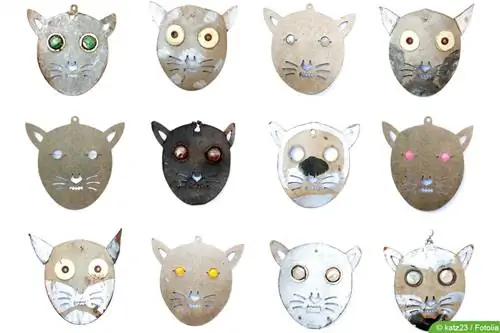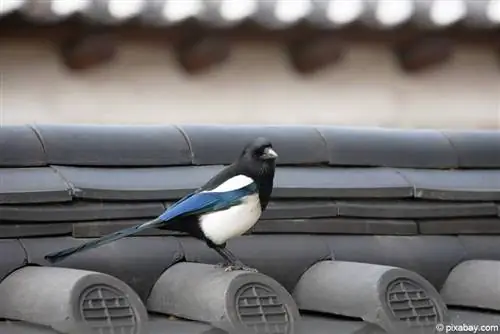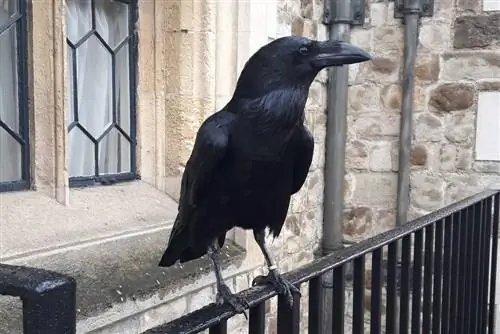- Author admin [email protected].
- Public 2023-12-17 03:39.
- Last modified 2025-01-24 12:45.
Pigeons in particular, but also many other species of birds, can become a problem on the balcony in the city. This is mainly because the animals cannot find any other suitable place to stay in the narrow streets without trees. The following article will explain how the birds can be driven away from the balcony without harming them.
The Problem
Especially when pigeons settle on the balcony, there aren't just one or two specimens coming here. The animals in a pack usually choose a balcony or eaves as a place to sleep. But pigeons in particular can also transmit pathogens in certain cases, especially through their droppings. Sparrows also look for small corners and niches in the masonry in which they can nest. And swallows build their nests under eaves or a corner of the balcony roof. Sparrows and swallows can also leave a lot of dirt on the balcony. Woodpeckers, on the other hand, can even cause significant damage to the masonry in their search for food. But why do so many birds nest on balconies? This is mainly due to the following:
- Cities are becoming more and more densely built
- the natural environment is taken away from the birds
- Trees are usually only found in outlying areas of cities
- some bird species such as swifts and house sparrows, however, have always used the buildings
- You can often find food on balconies
- Crumbs from cake or bread attract the animals
Legal situation
Birds may seem annoying to some people, but they make an important contribution to biodiversity and the preservation of the ecosystem. However, human activity has already reduced the number of birds. To ensure that the population does not continue to decline, bird protection has been strengthened through a number of laws.
This primarily includes:
- EC Birds Directive
- Federal Nature Conservation Act
- State Laws
All European bird species, including nesting birds such as house sparrows or swallows, are protected under Article 44 of the Federal Nature Conservation Actprotected all year roundAccordingly, it isbannedto capture, injure or kill these animals. The nesting sites of the birds that are loyal to the site are also protected. They may not be removed, damaged or destroyed. Deterrence measures are therefore only permittedoutside the breeding seasonin order to implement construction measures. Violations of these regulations will be punished with afine in a not inconsiderable amount.
Putting a bird net
Bird nets are often put up to keep the birds away from the balcony. However, this is not without danger: the birds can get caught in the nets and die. However, according to Article 44 of the Federal Nature Conservation Act, injuring and killing protected birds is prohibited. However, the networks per se are not banned. Since the nets also significantly restrict your own view, they are only recommended for balconies that face a busy street and are therefore rarely used. In addition, due to the changed exterior view of the house, the landlord or, in the case of a condominium, the owners' association must agree before the net is tensioned.
Distribute with CDs
Blank CDs can also be hung up as decoration but especially as a defense against pigeons and other birds. These have the property that they constantly reflect light due to the mirror surfaces and their movement, which deters animals from heading for the balcony. When hanging the CDs, the following should be noted:
- Make the CD decorative on the labeling surface
- with colorful foil
- with felt-tip pens
- make a fish with crepe paper
- the mirror surface must not be edited
- Use fishing line for threading
- for example, design as a mobile
- Hang in a corner or in the middle of a balcony
Tip:
In addition to being an effective bird deterrent, these mobiles made from CDs are also a very decorative balcony design where there are no limits to your creativity.

Set up plastic birds
Plastic birds are available in well-stocked garden shops. These are mostly modeled on owls and ravens. Most bird species shy away from these birds and are therefore driven away by the plastic animals and do not fly to the balcony at all. The plastic birds should be set up as follows so that they are not only a deterrent but also decorative:
- directly on the balcony railing
- find a place here between the plants
- Always place plastic birds elevated
- this is how the birds see them directly when approaching
- Use several plastic birds on a long balcony
Tip:
Decorated in a back corner or on the floor, the plastic birds often fail to achieve their desired effect. Because here they are not directly seen by the birds when they approach and they usually end up on the balcony.
Spikes on ledges
If there are no small children in the household, defensive spikes can also be mounted on the balcony railing and on ledges. However, the risk of personal injury is very high here, so defensive spikes should be avoided in households with children.
Tip:
Make sure that the “tips” of the spikes are rounded. Injuring birds using spikes is prohibited. This measure is only intended to make things uncomfortable for uninvited guests.
Spikes are usually attached as follows:
- finished spikes available in well-stocked stores
- nail bases made of plastic
- the rounded ends point upwards
- Attach the defense device to the balcony railing
- Birds have no way to settle
Acoustic bird deterrent
The birds and especially the pigeons can be frightened by noises at first. But if these don't change over a long period of time, the animals can get used to them and then no longer take any notice. They end up on the balcony again. However, the following acoustic defense systems can be used if changed week to week:
- hang up little bells
- Dog barking
- Screams of birds of prey
- a loud bang, do not use at regular intervals
Tip:
Especially various noises that are intended to ward off birds can also be very stressful for people. It is urgent to comply with the different noise limits.
Garlands, aluminum or mirror foil
Birds are deterred by fluttering, glittering or reflections on the balcony. These light reflections can also be easily created with decorations on the balcony and are therefore not only effective but also offer a decorative look. These products are particularly suitable for balconies on the south side of the house, as on nice days the sun can fall on the objects all the time, thereby increasing the amount of light reflections. The following items are suitable for keeping birds off the balcony:
- Rose balls
- Balls made of plastic or glass
- can be found in the decoration department at garden stores
- are put into the flower boxes
- Hang strips of aluminum foil
- wind and sun create light reflections
- colorful balloons and garlands can also deter the birds
- these are hung up and blowing in the wind
- However, balloons filled with air need to be replaced more often
Tip:
But a little caution is also required with this measure. For example, if the house is on a busy street, the light reflections could blind drivers and cause more accidents.
Avoid reflections
There are birds that see a strange member of their species in their own reflection, for example in the glass of the balcony door or a window on the balcony. Therefore, the birds are attracted to the reflections and increasingly land on the balcony. But this can also be effectively remedied:
- cover the lower part of the window
- with foil, fabric or cardboard
- doesn't often look very decorative
- Leave external blinds down for several days
- Beautify the outside of the window with decorative spray
However, if the birds remain stubborn and keep flying at the window on the balcony, then a mesh or fly screen installed in front of the window will also help.
Destroy nests and eggs?

The nests and eggs of street pigeons may be removed from your own balcony.
ATTENTION:
However, this does not apply to protected species such as songbirds, swallows or wild pigeons (e.g. wood pigeons) if they have already settled.
Corners where swallows like to nest should therefore be prepared beforehand so that they become unattractive for the birds to build nests in. However, against pigeon nests thatdo not belong towild pigeons, you can and should proceed as follows:
- Dispose of nests again and again
- so the pigeons lose interest in building
- Eggs located here may be disposed of
- you can also call a specialist for help
- Don’t kill birds
All birds, not only songbirds, but also pigeons, are undernature protectionand therefore maynot be killed.
Be careful when cleaning
If the birds have been effectively driven away, the balcony must be cleaned of bird droppings. This is because it is very aggressive and massively attacks the masonry and the floor covering. The balcony furniture also needs to be cleaned so that no unsightly stains appear. To avoid transmission of possible pathogens, the following precautionary measures should be observed when cleaning:
- always wear gloves
- Wear a face mask
- because otherwise the smallest particles will be inhaled during cleaning
- sturdy shoes, do not work barefoot
- spray disinfectant after cleaning
- this is how all bacteria and viruses are killed
Prevention
The birds like to settle where they can find food, even if the residents of the apartment with an adjoining balcony often do so unconsciously. Anyone who hangs a birdhouse on the balcony should not be surprised if it is not only flown to by robins or titmice, which are usually supposed to reach it. Pigeons and sparrows in particular are attracted by this, but since these two bird species usually appear in flocks, it is inevitable that these birds will take over the balcony. But there are also other aspects that attract birds and should therefore be avoided:
- Don’t leave leftover food on the balcony
- also remove crumbs on the table and floor directly
- do not hang up bird balls in winter
- do not provide nesting sites
- It is better to offer both away from the house






